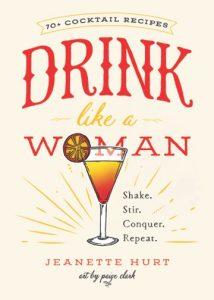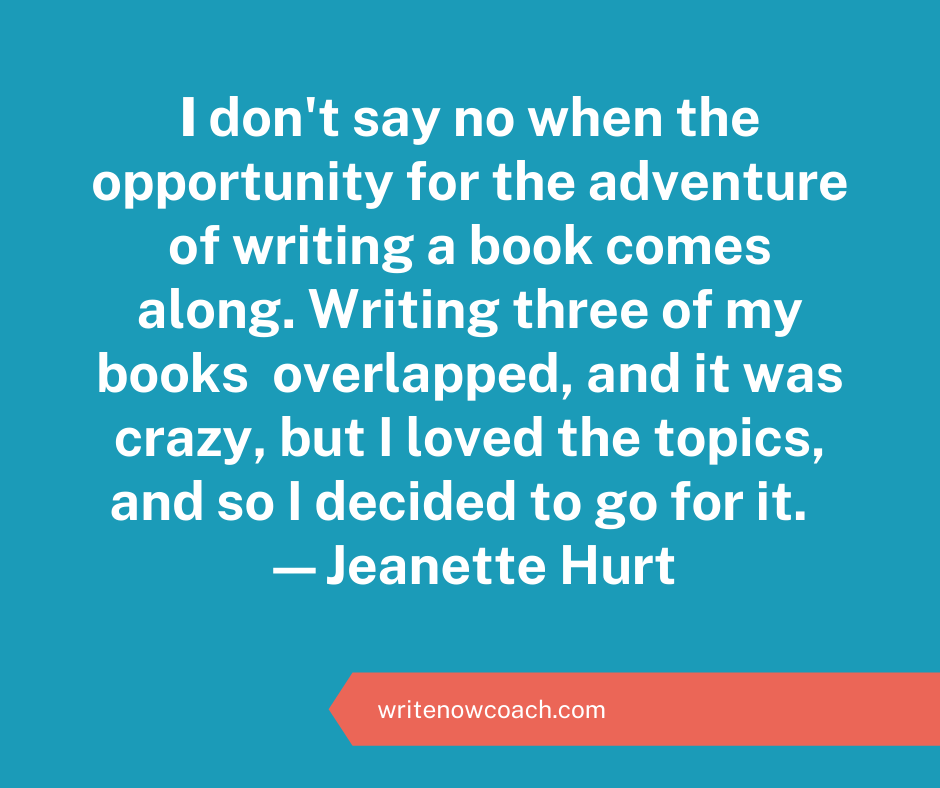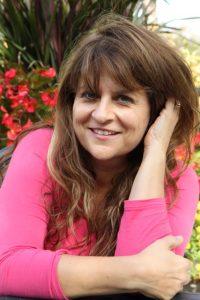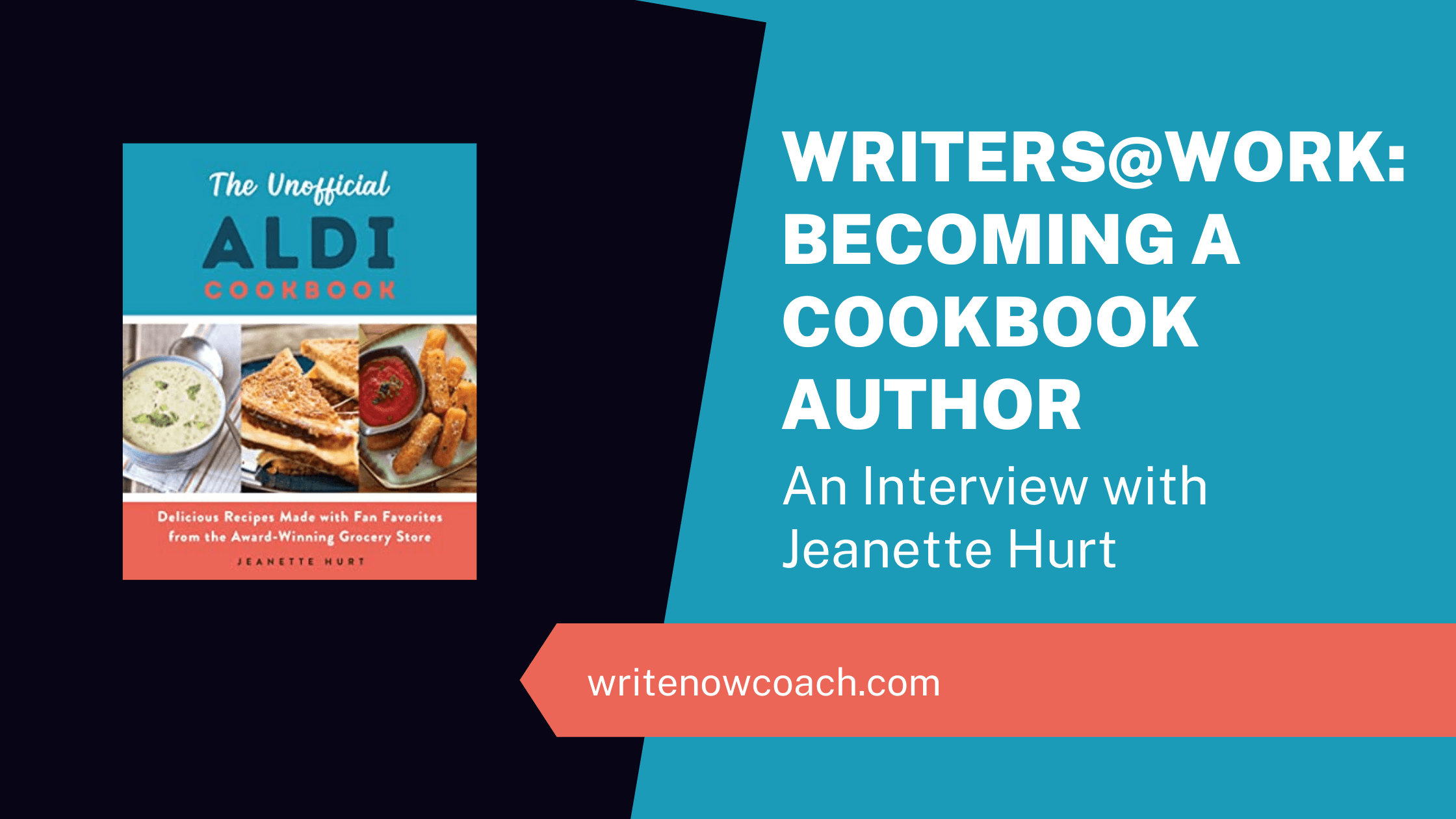How to Become a Cookbook Author
June 1, 2021
Note From Rochelle
Dear Writers,
Happy June!
The beginning of a new month gives us another chance to revisit our goals. It’s called the Fresh Start Effect, and I wrote about it a few years ago in a blog post. Take time this week to revisit your goals, check your progress, and decide what you want to accomplish before the month is over.
 Today’s post features an interview with my friend Jeanette Hurt, who’s an accomplished food and beverage writer and the author of many books including my personal favorite, Drink Like a Woman. I’m always impressed with Jeanette’s work—and she has a lot to teach aspiring food writers. Welcome, Jeanette!
Today’s post features an interview with my friend Jeanette Hurt, who’s an accomplished food and beverage writer and the author of many books including my personal favorite, Drink Like a Woman. I’m always impressed with Jeanette’s work—and she has a lot to teach aspiring food writers. Welcome, Jeanette!
Enjoy!
Rochelle
Writers@Work:
How to Become a Cookbook Author
An Interview with Jeanette Hurt
Jeanette, welcome to the blog! Can you tell us about your latest book?
I think you’re referring either to The Unofficial ALDI Cookbook or Wisconsin Cocktails, but those two books, along with Cauliflower Comfort Food and The Joy of Cider: All You Ever Wanted to Know about Drinking and Making Hard Cider, all came out within less than two years.
All four books overlapped or were sequentially written, and it was a crazy time period. It’s not the first time I’ve written more than one book at a time—I’ve done that twice—but it was definitely the most intense.
I’ll talk about both Wisconsin Cocktails and The Unofficial ALDI Cookbook because both are really meaningful to me in different ways.
Wisconsin Cocktails was born from a conversation with an editor at the University of Wisconsin Press at a writer’s conference. I didn’t actually have a book idea when I met with her, but she was from Wisconsin and I was from Wisconsin so I decided to meet with her. My Drink Like a Woman book had just come out so we started talking about the brandy old fashioned. And then this editor said, “What about our Bloody Marys and our ice cream drinks?” And within a week, I had a book deal.
I’m particularly proud of Wisconsin Cocktails because I pinned down the exact reason why we drink brandy, and it’s not the story you most often hear (and this story is still being retold, which actually pisses me off because lazy writers at big, national publications aren’t digging deeper). I spent a year researching this cocktail and others, combing through the modern-day equivalent of newspaper microfiche. I also dug through old restaurant and bar menus at a historical society, and I interviewed dozens of bartenders and distillers. Because of this book, I’m now being called a “cocktail historian,” which is kind of cool. (A story about my journey figuring out the history is published on Alcholprofessor.)
My ALDI book also is kind of serendipitous. I had just finished my cauliflower book, and my publisher wanted another idea from me. Ulysses Press has a series of cookbooks about Trader Joe’s, and I knew that Trader Joe’s and ALDI have a connection (one of the two brothers who own ALDI also owns TJ’s), and I also knew that ALDI has fanatical fans just like TJ’s. On top of that, I grew up with a mom who shopped at ALDI before it was cool, and I’ve shopped at ALDI my entire adult life.
So, I had my agent pitch the idea, and my publisher, which is based in Brooklyn where there aren’t any ALDI stores, wasn’t sure if ALDI would have enough of a following for a book. So they actually hired me to develop two recipes, which they test-marketed. A few weeks later, I had a book contract, and I was so grateful to have this book to work on during the pandemic, because I got the contract less than a month before everything shut down.
It was a really fun book to write, and one of my sisters, who is a big ALDI fan, shared a lot of recipe ideas with me, and it was a book that was pretty easy to write because I mostly shop at ALDI.
Can you talk about the unique challenges of writing a book with recipes?
One of the things I learned way back in the day when I was a reporter who tested recipes for the newspaper food desk is that a lot of chefs and experienced cooks forget steps. A big-name chef in Milwaukee had submitted a recipe for caramelized Brussels sprouts – but he didn’t include the step to heat the pan before you add the oil to it – so, when I tested it, it came out burnt. Burnt Brussels sprouts are horrid, but caramelized ones are divine.
When I develop a recipe, I include the heat-the-pan steps. You have to write your recipes for the least experienced cook so that, when they follow them, they’ll have a success. You also have to describe what “done” is – when the cake is no longer jiggly in the middle, when the meat reaches a certain temperature, etc. Every home stove is different, and many times, the temperature on a stove could run hotter or colder than what a recipe specifies, so you need to give people clear guidelines.
When I just cook for my family, I seldom measure anything – I’ve got a great palate, and I know how much salt is enough just by eyeballing something. But when I develop recipes, I measure everything out exactly. Because I’m always cooking and experimenting, I usually base my recipes on things I’ve already played around with in the kitchen.
Any advice for writers who want to do this kind of a book?
First of all, every cookbook writer and recipe developer has their own system—there’s no one “right” way. Secondly, you don’t need a culinary school degree to do this – it can help, sure, but it isn’t necessary. That was one thing I thought, early on in my freelancing career, that held me back. Also, people kept telling me how hard food, beverage, and travel writing is—but those things are my passions, and it’s easy for me to come up with story ideas because I love them.
If you’re just starting out, publishers look for writers with good social media followings. That can definitely help you. But to be honest, I don’t have a huge social media following, and social media marketing is not one of my greatest strengths, so you can do this without being an Instagram goddess or a Twitter god. I love food, I love cocktails and wine, and I have a great palate. I also am not a diva writer—I make my deadlines, I’m easy to work with, and my work and my recipes are solid.
Also, I highly recommend the American Society of Journalists and Authors—this is where I met my agent and most of my publishers and editors. ASJA has this program called Client Connections, which is speed-dating for writers and editors, and that’s how I made a lot of my connections.
You write so many books—and so fast. Plus you’ve had your child home during the pandemic. What is your secret to writing productivity?
Well, I don’t say no when the opportunity for the adventure of writing a book comes along, to paraphrase Amelia Earhart. My agent had just sold my cider book when I met the editor of UW-Press and then six months later, met the editor of Ulysses Press. Those three books all overlapped, and it was crazy, but I loved the topics, and so I decided to go for it.
I’m now working on two (yes, two) new cocktail books for the University of Kentucky Press—I met the editor on a panel at ASJA last fall (it was virtual), and she said she wanted to work with me, so I said yes.
Sometimes, when I’m writing a book, I have to cut down on the articles I write, and sometimes, I just write books in bits and pieces. I keep a list of everything I need to do in a day, and I seldom check everything off, but the list does help keep me on track.
Also, when you are the “learning coach” for your child, like I am, you have to set boundaries, and you also have to be gentle with both yourself and your child or children.

You have done some television appearances to promote your latest book. Can you talk about how those came about—and how you prepared for them?
Some came from a book publicist, and others came because of connections I’ve developed over the years. I live in a tiny house, and my kitchen is really the only place I can adequately ZOOM from, so it’s never been this clean. Also, what you won’t see is the beforehand stuff—ironing my kitchen towels, etc. My sister is an actress, and she and her friend coached me on what I needed to do. I also once had water dripping from my kitchen ceiling 40 minutes before I was to do a live appearance, and that did freak me out, but I stopped the leak, and then went on camera. (There was a leak in the sink in our bathroom).
What are you reading now?
I recently discovered Denise Grover Swank’s southern mystery series, and I absolutely adore them. I’m also going to read that book on time management whose author you featured (The Workplace Guide to Time Management by Phoebe Gavin) (https://writenowcoach.com/how-a-viral-video-led-to-a-book-deal/) I also love Damon Brown’s Build From Now – Damon’s my writing goal buddy, but this is really one of his best books, and it’s about harnessing our individual resources. We all have time, energy, focus and agility, but in different amounts. My greatest strength is agility or flexibility – I can switch tasks pretty effectively, so that’s what I use in my daily life to get things done. I also have a lot of energy so I capitalize on that. But my time is limited, and my focus is not what I want it to be. It’s a matter of leveraging your strengths.
 About the author. Jeanette Hurt is an award-winning – and now best-selling – author of 15 books, 14 on food and drink. The Unofficial ALDI Cookbook is an Amazon bestseller, and along with it, Wisconsin Cocktails, Cauliflower Comfort Food and The Joy of Cider were all written within the past two years. She writes about food and drink for Forbes, Alcoholprofessor, Huffington Post and dozens of other publications, and she develops recipes for health care organizations and magazines. When she’s not writing or developing recipes, you can find her walking along Lake Michigan with her husband, their son and their chihuahua-great Pyrenees rescue dog.
About the author. Jeanette Hurt is an award-winning – and now best-selling – author of 15 books, 14 on food and drink. The Unofficial ALDI Cookbook is an Amazon bestseller, and along with it, Wisconsin Cocktails, Cauliflower Comfort Food and The Joy of Cider were all written within the past two years. She writes about food and drink for Forbes, Alcoholprofessor, Huffington Post and dozens of other publications, and she develops recipes for health care organizations and magazines. When she’s not writing or developing recipes, you can find her walking along Lake Michigan with her husband, their son and their chihuahua-great Pyrenees rescue dog.









